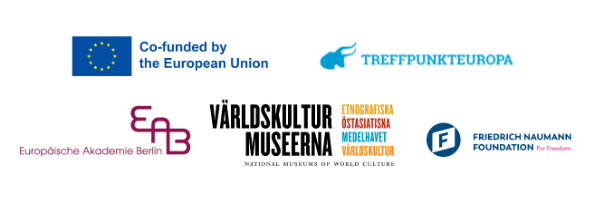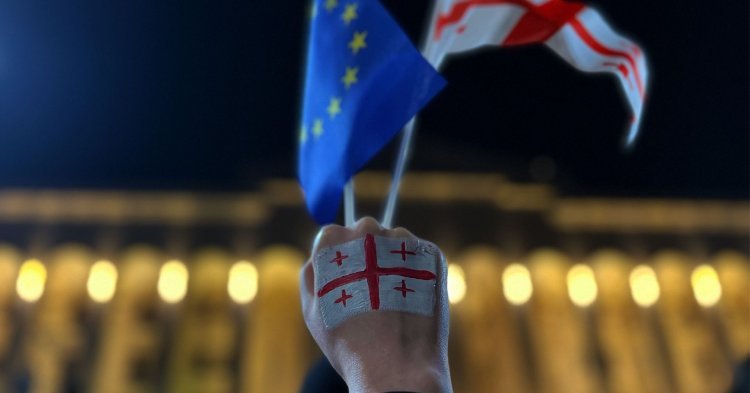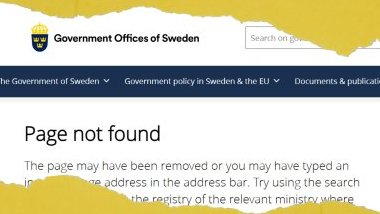„It was a very unpleasant situation, and it was almost impossible to breathe - still people were chanting for freedom and were not scared by the dissuasive measures of the government.“
Keti Archaia describes her experience as a young Georgian citizen being hit by tear gas and water cannons when she joined the protests against the “foreign agents bill” to fight for a democratic future in Georgia.
Georgia, a small country in the Caucasus Mountains, home to less than 4 million people, rarely makes international headlines. However, on 8 March 2023 a photo of a woman (47-year-old Nana Malashkhia) waving the EU flag while being hit by a water cannon became viral. Protests erupted in the capital Tbilisi due to the proposal of a bill targeting NGOs and media outlets funded by foreign investors. The “Law on Transparency of Foreign Influence” was proposed by the People’s Power movement, claiming undue influence by the US and the EU in internal affairs as the main concern. According to the draft proposal, organizations whose annual revenue is covered by foreign funds for at least 20% would have to register as “agents of foreign influence” and accept surveillance from the Georgian Ministry of Justice.
Critics and civil society representatives immediately drew comparisons with a similar law introduced in Russia in 2012 which has been instrumental in the suppression of dissent from media, human rights groups, and others. This similarity, many feared, would alienate the West, pushing Georgia further into the Russian orbit. However the People’s Power movement countered these allegations with a statement explaining that the Georgian bill was actually based on the US Foreign Agents Registration Act (FARA).
‼️ The bill on "foreign agents" has been withdrawn from the Parliament of Georgia
For two days a rally against the bill on "foreign agents" was held in #Georgia. The police violently dispersed the protests in #Tbilisi. The night before, water cannons and tear gas were again… pic.twitter.com/4vyN0a20r7
— NEXTA (@nexta_tv) March 9, 2023
Why the EU flag, then?
Georgia finds itself in a particularly delicate geopolitical position: caught between its Soviet past and its European ambitions, this country is trying to enter the Euro-Atlantic sphere without angering the Kremlin. In August 2008 tensions culminated as Russia invaded Georgia in order to back separatists in the regions of South Ossetia and Abkhazia, occupying these regions ever since.
More recently (in early 2022) Georgia, together with Moldova and Ukraine, was preparing to apply for EU membership in 2024. However, due to the Russian invasion of Ukraine, all three countries expedited the process and submitted their applications. Moldova and Ukraine were granted candidate status a couple of months later, while Georgia’s bid to join the Union was interrupted by the European Commission’s request to fulfill 12 conditions.
Professor Eva Heidbreder, professor of European Studies at the Otto-von-Guericke University in Magdeburg (Germany), says that accession into the European Union follows clear guidelines and political considerations, making the accession of Georgia into the Union in the near future very unlikely. The reason why Ukraine and Moldova were granted candidate status, unlike Georgia, “clearly has to do with extreme political stress” - Heidbreder notes - nevertheless, the EU will still apply its accession criteria for proper membership.
As required by the treaties, the EU Commission evaluates the economic and political status of all new applicants: while Georgia’s economy was not an issue, the political landscape posed many questions. The 12 recommendations include, among others, matters of political polarization, institutional functioning, judicial reform, human rights and gender equality, and the most challenging of all, de-oligarchisation, the process of dismantling the influence of a few wealthy and powerful actors in the state affairs of many post-Soviet countries - Georgia included. In fact, despite overwhelming popular support for EU standards of democracy and rule of law, the influence of russophile oligarchs in Georgia’s political scene, such as former Prime Minister Bidzina Ivanishvili and founder of the party Georgian Dream, have put a stop to many democratic reforms.
According to the High Representative of the European Union for Foreign Affairs and Security Policy, Josep Borrell, the bill would have put Georgia’s attempt to join the EU in jeopardy. The national uproar and international scrutiny eventually led to the withdrawal of the bill, however Georgians are not letting their guard down.
What does the situation on the ground look like?
The opposition of the Georgians, especially the younger generations, to the autocratic turn of their government was so fierce that it ended up in the government withdrawing the bill. This explains the presence of so many EU Flags in the protests, which for the younger Georgians, like Keti Archaia, is a symbol of a better way of life where there is political freedom, free speech, respect for the rule of law, and equal rights for everyone in their country.
However, Keti believes that Georgians are not ready to join the EU yet, especially the older generations. They value the EU only in terms of the economic advantages that a possible accession would give them without understanding what joining the European Union means and what it takes to get there, in other words, accepting the Copenhagen criteria. Still, Keti is sure that with the values of the young Georgians and the future generations, the goal of joining the EU will soon be achieved.
Keti sees the government, the generational conflict in her country, and the Russian threat as the main impediments to Georgia being granted the EU candidate status in the near future and not so much a lack of willingness from the EU.
So, what do these conditions for EU membership look like?
First, there are the standard accession criteria, called the Copenhagen criteria, which generally include institutional reforms as a basis for a democratic and stable country. Here the EU has some leverage to influence the rule of law of the candidate countries. However, the Union maneuvers itself in a “kind of trap,” as Prof. Eva Heidbreder puts it, warning that once a country becomes a member, the EU loses much of its influence on individual states without membership as an incentive. In any case, only if these criteria are fulfilled would membership be possible for Georgia.
Secondly, there are geopolitical considerations at play. According to Heidbreder, it is highly “unlikely that the EU would take in a member-state in conflict with Russia.” Georgia’s Russian-occupied territories of South Ossetia and Abkhazia are conflict hotspots, where “it is very likely that would escalate from the Russian side.”
„Does the EU have instruments to resolve this [conflict] ? – No!“
– Eva Heidbreder, Professorin an der Universität Magdeburg
For Heidbreder it is clear that EU foreign policy does not have the means to deal with the conflict. If the EU cannot grant Georgia membership quickly due to institutional and geopolitical reasons, then the question remains: how can it prove its commitment to Georgia without losing the credibility of its enlargement-based foreign policy? The EU can offer many association deals for now: “anything but membership [although] not said publicly.”
Protest in front of the Parliament of #Georgia against the law "On Foreign Agents"
Students, participants of the "Women's March" and ordinary citizens have already come to the parliament building in #Tbilisi. pic.twitter.com/31bByHT6Nk
— NEXTA (@nexta_tv) March 8, 2023
Heidbreder stresses that for Europe, it is crucial how the Russian war against Ukraine ends. Only then will the geopolitical question be solved, and the issue for countries like Georgia becomes one to see how far political elites move in de-oligarchisation and political reforms. For many Georgians, the promise of the EU is very powerful. A vision that represents a high living standard and symbolizes many freedoms.
For Georgia, fulfilling the 12 priorities to become a member of the EU could come with a price – a price that Ukraine sadly is paying with war after its Euromaidan revolution. Keti Archaia sends a message to Europeans: the EU needs to be careful with Russia and strive for economic independence from Russia. In fact, it is better to pay a small price now rather than a big one in the future.
“Look at Georgia and evaluate us not through our government but through our people,” she says, ”Georgians, especially the younger ones, stand for values closer to EU values than it seems.”
This article is part of the project "Newsroom Europe" which trains young Europeans from three EU Member States (Germany, Sweden and Spain) in critical and open-minded media reporting and on the functioning of European decision-making. The project is carried out jointly by the Europäische Akademie Berlin e.V., the National Museums of World Culture Sweden, and the Friedrich Naumann Foundation Spain, and is also co-financed by the European Union.

Project partners “Newsroom Europe”







Follow the comments: |
|
